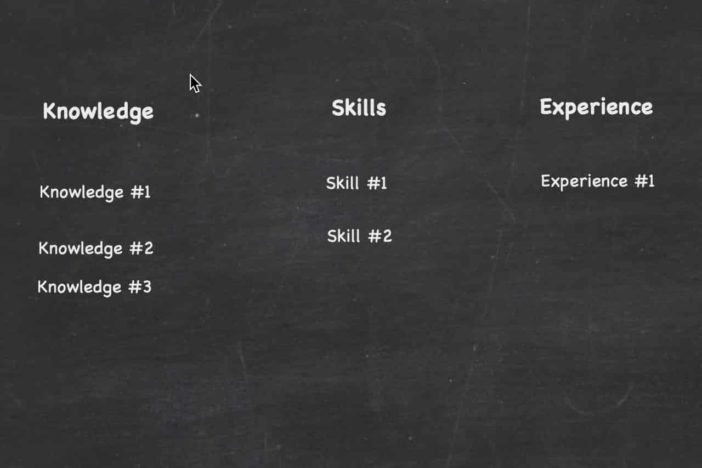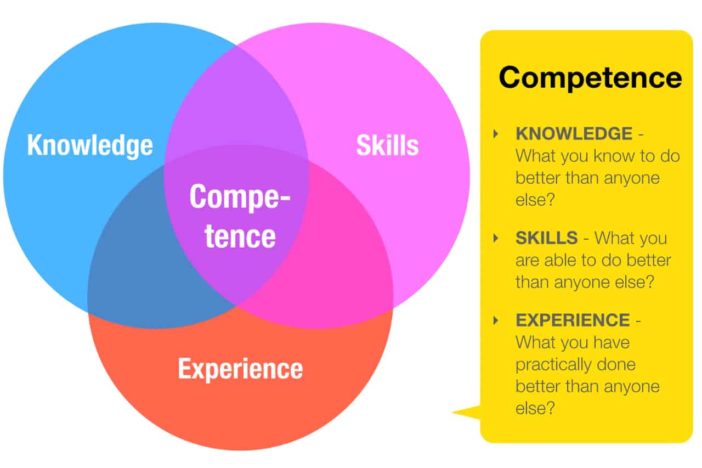Nobody who starts their first business has experience in starting a business. The experience can bring more substantial business potential energy into your startup. So, the question is how to start a business with no business experience.
Starting a successful business is not always strongly related to your entrepreneurial experience. Historically, you can find that many of the most successful companies today are started by inexperienced entrepreneurs. I always say that you need the right competence when you want to start a business.
Your entrepreneurial competence is a combination of your entrepreneurial knowledge, entrepreneurial skills, and entrepreneurial experience. So, now as you can see, you already have knowledge about something, and you already have skills about something. You have no business experience, and you are afraid to start a business with no business experience. If you do the simple math, you can conclude that you already possess 2/3 of something that brings potential energy for your future startup.
When you succeed to mix these three things in the right way with the business idea you want to transform into a successful business, you will be much closer to launching this business. So, here are some guides that will help you to start a business with no business experience.
Start a Business With No Business Experience Step #1: Develop A Business Idea Around What You Already Possess
This is one of the most important things when it comes to your future business because you will start building something on what you already possess. Ask yourself the following questions:
- What is the most significant knowledge that makes me different from others?
- Can I use that knowledge to build something special for other people?
- When I look at my past, what skills have I developed that no one can have?
- Can I use those skills to build something special for other people?
- I know that I don’t have the experience to start and run a business. But what other experience I have that no one else has?
- Can I use those experiences to build something special for other people?
Related: How to Start a Streaming Music Business: Building an App Like Spotify
Answering these questions, you will have the right picture of what you already possess and how you can use it separately to build something special for other people. Using this exercise, you will also gain knowledge about where you need to improve yourself. But, more importantly, you can start combining your current differences from other people regarding knowledge, skills, and experience to create unique competence for your new business.

So, it is crucial to put these specifics inside the Venn diagram to locate your most significant competence on which you will start developing your business idea.

Step #2 to Start a Business With No Business Experience: Start Building Your Competence Through Knowledge About the Market
Now, when you have an initial business idea based on your most significant current competence, you can start building yourself as an entrepreneur. The question is, how you can do this. The most straightforward answer to this question is to do your research.
You need to answer by researching the following questions:
- Is there a market for my products or services based on the business idea I have developed my current competencies?
- If there is the existing market, is there enough demand for such products and services? How much is enough demand?
- Who will be the main competitors in the market? What type of competition exists there? What are the strengths and weaknesses of the competitors?
- What will be the most significant strengths and weaknesses of your products and services?
These questions will require extensive market research if you want to be sure that you have an idea that could turn out to be profitable.
There are eight most important reasons why small businesses are not profitable.
Keep in mind that, when you search for answers to these questions, you will need to adjust your initial business idea. Many times, after you do this research, your business idea will be different than your initial idea.
Start a Business With No Business Experience Step #3: Plan Ahead If You Don’t Want to Plan Quickly After Starting Up Your Exit
Now, you have your big idea based on your biggest competencies and adjusted according to your new knowledge achieved through market research. Now, it is time to start planning your next steps before you launch your company – both legally and in infrastructure.
Simply write down how do you want to implement your idea, transforming it from this stage to a real company that will sell products and services to real customers. What do you need to do tomorrow? What after tomorrow?
When you write your plan, think about taking one step at a time each day. In such a way, you will start increasing the knowledge, skills, and experience you will need tomorrow. Also, the important thing is to think about improving yourself and your plan each day, so you will be moving towards tour targets.
Related: How to Start a Food Delivery Business from Home
Step #4: Start Small to Test the Market and Everything You Come Up With Your Research
When you already have a plan, you need to start testing your market. Simply build your products and services and start talking with potential customers you have identified through your research.
The purpose of this step is to learn as much as possible about your customers, but at the same time to develop your entrepreneurial competence related to marketing, selling, and improving your total offerings.
Answer the following questions when you conduct these tasks:
- What is my total offering to my target customers?
- How do they respond to my sales pitch?
- How do they respond to my total offer?
- What do I need to improve my products and services?
- How much are they ready to spend on my current offer?
When you adjust everything as your target customers require, you are ready for your big launch. Don’t forget to build all the necessary systems your business will need.





